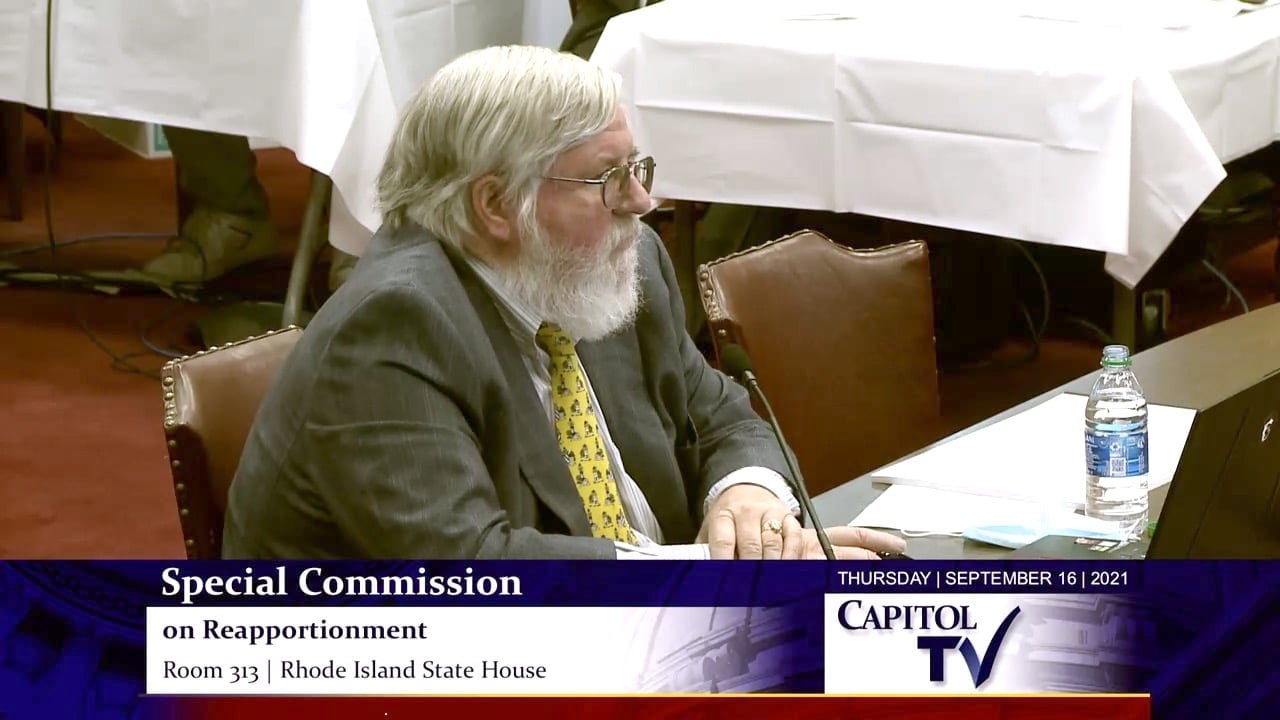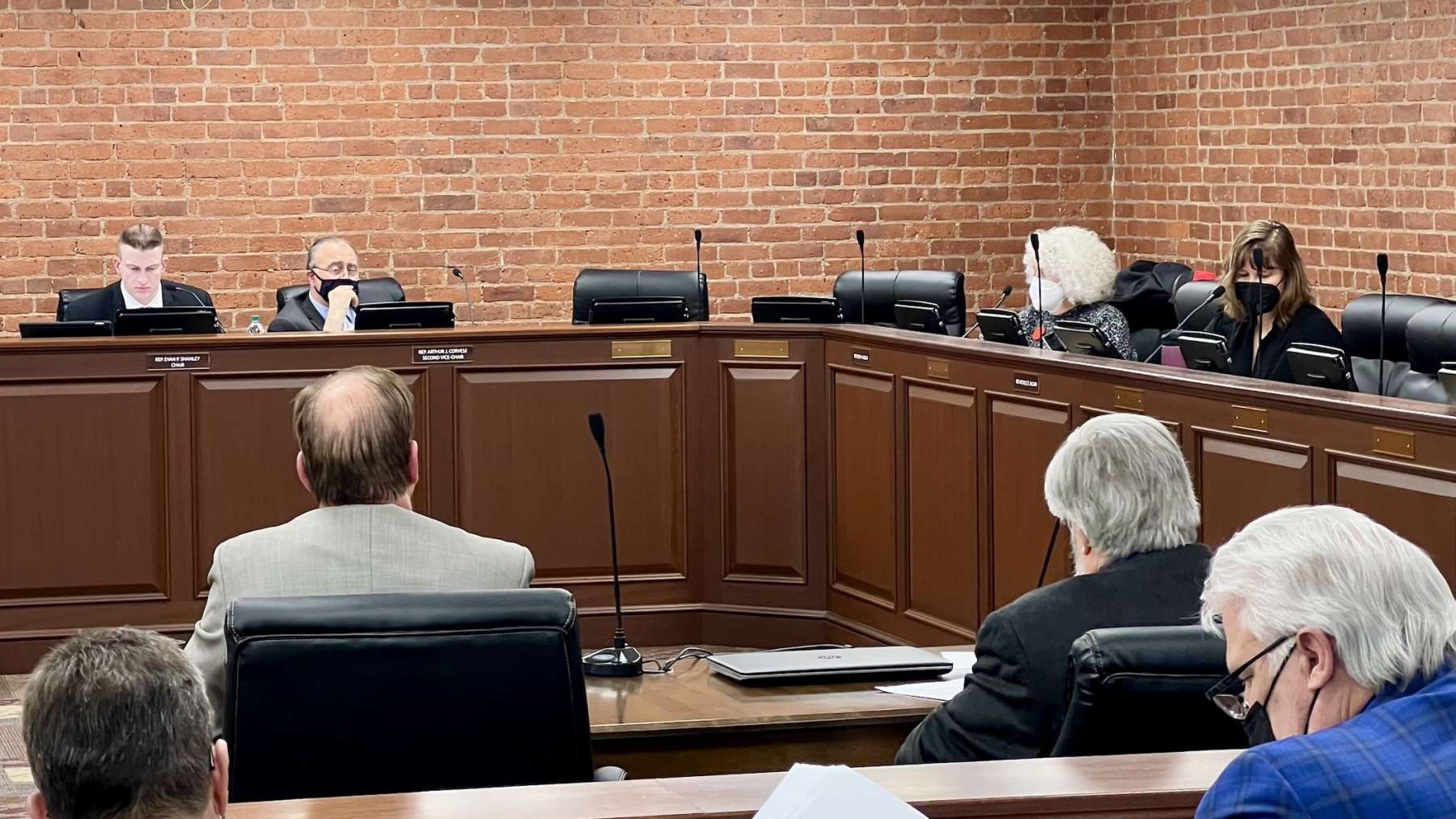Corruption and back-room deals: Redistricting Commission a massive failure
Hearing about reporters being denied access to the sub-basement office, Representative Michelle McGaw asked the consultant, “Is there a reason, Mr Brace, that [Uprise RI] was not permitted to visit the room?”
“Um, I don’t know the answer to that question,” replied Brace.
“Well,” said Uprise RI, “It was on a phone call with you that I asked to visit the room and was told no.”
February 8, 2022, 12:24 pm
By Steve Ahlquist
Contrary to the testimony of Representative Robert Phillips at yesterday’s House State Government and Elections Committee, the Rhode Island Redistricting Commission was not “open” or “transparent.” After 18 carefully televised and recorded meetings held across the state, one could argue that the public had every opportunity to understand the process, but just as you cannot judge the human rights record of China’s government based on the opening spectacle of the the Winter Olympic Games, the same applies to the openness and transparency of Rhode Island’s Redistricting Commission based on the spectacle of the public hearings.
All the biggest decisions about redistricting were made behind closed doors in secret meetings between General Assembly leadership, individual senators and representatives, and Kimball Brace of Election Data Services – the consultant hired by leadership. The meetings between individual legislators and the consultant took place in the sub-basement of the Rhode Island State House in a room that was deemed off-limits to reporters and members of the public.
During these meetings, legislators were given the opportunity to choose which streets, neighborhoods, and houses would be included in their districts and which streets neighborhoods and houses would be excluded. In this way every single legislator was not only assured that they would not be redistricted out of their elected position – they were also able to politically strengthen their hold on their districts by excluding voters who might want change and including new voters that might support them (sadly, this was often done along lines of class and race).
In essence, legislators were given the opportunity to choose their own voters, contrary to the point of our democracy, which is to allow voters to choose their legislators.
In his written testimony to the House Committee, John Marion of Common Cause Rhode Island talked about a measurement called the efficiency gap. (Uprise RI strongly recommends reading Common Cause Rhode Island’s written testimony, here.)
The efficiency gap measures, “the number of votes each party wastes in an election to determine whether either party enjoyed a systematic advantage in turning votes into seats,'” wrote Marion, adding that, “Just last week, the North Carolina Supreme Court ordered that state’s lines to be redrawn and named the efficiency gap as one of the criteria that must be considered when doing so.”
Marion continues:
“Using Planscore.org Common Cause Rhode Island calculated the efficiency gap for the three plans in this legislation. House Plan D has an efficiency gap of 11% Democratic. Senate Plan C has an efficiency gap of 11.4% Democratic. Congress Plan B has an efficiency gap of 21.8% Democratic. To give you some context, the most partisan gerrymandered state House maps range from +/- 18%. The most partisan gerrymandered state Senate maps range from +/- 22%. And the most partisan gerrymandered Congressional maps range from +/- 25%. These measures, and many others available from Planscore and other platforms such as Dave’s Redistricting, leave no doubt, these plans are Democratic partisan gerrymanders.
“Why is this? The plans you have before you value one thing above all else–protecting incumbents of both political parties. That is even though nothing in the enabling statute of the commission, or elsewhere in Rhode Island law, requires you to do so. By ceding this process to the state’s consultant the commission chose to value incumbent protection above all else.“
Every member of the Rhode Island General Assembly was provided the opportunity to meet with the consultant, Kimball Brace, and help draw their own maps. Brace publicly stated that every member of the General Assembly met with Election Data Services, but Senators Dawn Euer, Jeanine Calkin and Cynthia Mendes have all made public statements saying they declined these meetings. Newly elected Senator Samuel Zurier has stated that he met with the consultant but refused to participate in choosing his own voters, and Uprise RI was told by the consultant that “some legislators” took this position.
These statements are all well and good, but there’s an issue: It is impossible to determine which legislators did or did not meet with the consultant, when these meetings occurred and what was discussed at these meetings – because the meetings were kept entirely secret and no records were kept. There were no video cameras in the room, no notes taken. Legislators were able to alter the maps directly on the computer with the help of the consultant. No record was maintained of what these changes were, why they may have been made, and who was in the room when the changes were made. Every truly consequential decision about redistricting was made in this room, or in the offices of the Senate President and Speaker of the House, not during the televised hearings of the Redistricting Commission.
Uprise RI made an Access to Public Records Act (APRA) request for any and all information about these meetings and was told there were no documents related to the request. Uprise RI was even denied permission to visit the sub-basement room where these meeting took place.
Hearing about reporters being denied access to the sub-basement office, Representative Michelle McGaw asked the consultant, “Is there a reason, Mr Brace, that [Uprise RI] was not permitted to visit the room?”
“Um, I don’t know the answer to that question,” replied Brace.
“Well,” said Uprise RI, “It was on a phone call with you [Brace] that I asked to visit the room and was told no.”

There are all sorts of good, guiding principles to govern decisions that need to be made when engaged in the process of redistricting, but aside from following the strictest letter of the law, the one and only guiding principle of the redistricting commission was to protect incumbents. Protecting incumbents seemed to be the only purpose of the commission; anything else accomplished is an accidental by-product.
Even the one positive element in this legislation – the reallocation of some (around 40%) incarcerated persons at the Adult Correctional Institutions (ACI) to their home districts – happened between meetings. No public meetings were held where commission members discussed how to do prisoner reapportionment. The decision as to how to do what was ultimately done came from outside the hearings, between the meetings, probably from State House leadership, and the Redistricting Commission simply approved the plan.
For a model of how redistricting can be done in a truly open and transparent way, check out the Providence Committee on Ward Boundaries. This committee has, so far, been a model for how this process might be conducted state wide.
Finally, there is the issue of language included in the redistricting bill that allows the chairs of the Democratic and Republican Parties to replace elected members of district committees with district residents they choose. Uprise RI covered this issue here. In essence, District Committees have the task of endorsing certain candidates in the event of a primary. After the District Committee makes their endorsement, the preferred candidate receives a star next to their name on the ballot.
Representative Evan Shanley, who chairs the House State Government and Elections Committee informed those attending the hearing that this language was under revision and would be released shortly, but only after the second and most likely last public hearing on the redistricting bill. The public, as it stands right now, will not be allowed a chance to comment on the final version of the bill before it is approved.
There are at least two more hearings on the redistricting bill in the General Assembly. The House State Government and Elections Committee will be holding a second hearing today (Tuesday) at the Rise of the House (around 5pm) and the Senate Judiciary Committee is holding their first (and perhaps only) hearing on the bill at the Rise of the Senate (around 5pm). It’s too bad these hearings are happening simultaneously. It will make it harder for advocates to follow the issue.
Resources:







